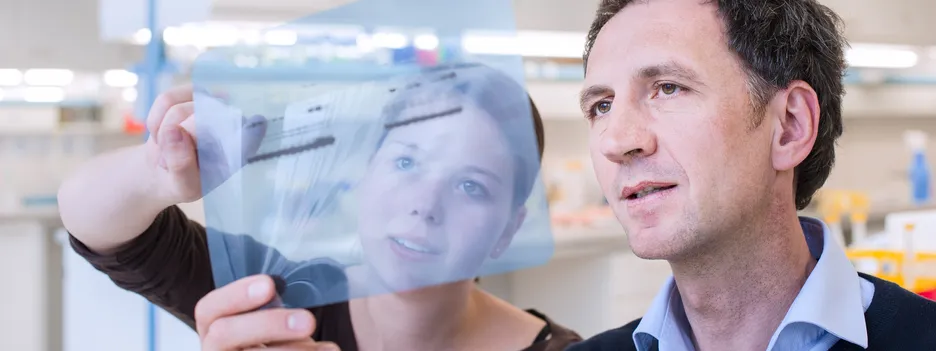
Measures of Quality Assurance during the Doctorate
Mentors
In addition to their supervisors, mentors will support the doctoral candidates during their doctoral research work. In general, mentors provide subject-specific support, but they can also focus on advising the candidates with regard to transferable skills, coaching and career development. Mentoring in the doctoral process is a central component of the doctorate at the Technical University of Munich (TUM).
Supervision Agreement
Even before the start of the doctoral process, it is essential to disclose and record the expectations of doctoral candidates and supervisors. The supervision agreement is the basis for every doctoral project at TUM. It defines the key aims, objectives, and milestones of the research project and lists the qualification elements. The supervision agreement is akin to a declaration of commitment that specifies the rights and obligations of the parties involved in the doctoral process. The supervision agreement is also an ongoing document whose contents can be updated at any time.
Cooperative Doctorate
Doctorates in cooperation with Universities of Applied Sciences, Non-University Research Insitutions, and companies have to live up to the highest standards. They are subject to the same strict quality assurance mechanisms as internal doctoral projects. In collaboration with partners from the Munich Area, TUM-GS has developed recommendations that ensure the quality of cooperative doctorates and guarantee full transparency. You can download the handout here.
Membership
The mandatory membership in the TUM-GS ensures that all doctoral candidates at TUM benefit from the same structural framework. It also enables them to complete the required subject-specific qualification and transferable skills training. The basis for this are the TUM regulations for the awarding of doctoral degrees and the associated mandatory membership in the TUM-GS.
Kick-Off Seminar
At the beginning of the doctorate at TUM, the best possible preparation for the further academic path should be provided. The TUM-GS Kick-Off Seminar therefore focuses on the networking of doctoral candidates and their integration into an excellent academic environment. Over the course of three days, doctoral candidates receive a lot of important information about the doctorate at TUM and an introduction to good scientific practice. There is also plenty of room for networking through activities such as a specially developed escape game. A two-day workshop, led by experienced trainers and focusing on different topics, rounds off the kick-off seminar and offers an insight into the interdisciplinary qualification program of the TUM Graduate School.
Good Scientific Practice
It is the responsibility of scientists to apply the fundamental values and standards of scientific research correctly. Therefore, all doctoral candidates at TUM are obliged to work according to the principles of good scientific practice (GSP). At the Kick-off Seminar, every candidate will be sensitized to the issue and receives a copy of the TUM Code of Conduct. In addition, TUM-GS and its Graduate Centers offer advanced seminars and workshops.
Active Participation in the Academic Environment
Deciding to do a doctorate at TUM also means being actively involved in the academic environment at TUM - this applies in particular to external doctoral candidates. All doctoral candidates at TUM are expected to actively participate in the academic environment, including external doctoral candidates in particular. In general, participation in the academic environment is demonstrated by attendance at TUM, working at TUM, teaching, supervision of students, or through participation in a TUM research group.
Feedback Talk
Regular exchange on the doctoral project is essential - both for doctoral candidates and supervisors. A documented feedback talk therefore takes place no later than four semesters after entry in the doctoral candidacy list. Based on the supervision agreement, the doctoral candidate and supervisor jointly discuss the current status of the doctoral project and the qualification program and determine further steps and tasks.
Publication
Publishing is an essential component of any academic career. TUM therefore expects all doctoral candidates to present their research project to experts in the international scientific/academic community for discussion during the doctoral phase. As a rule, this is done by submitting peer-reviewed publications or conference contributions that are subject to a peer review process.
Subject-specific Qualification and Transferable Skills Training
Subject-specific courses for doctoral candidates form an important part of the qualification process during the doctorate. Therefore, all doctoral candidates are required to attend subject-specific and subject-related courses and participate in qualification measures for a minimum of 6 weekly hours per semester. The relevant courses and events are offered by the chairs and degree-awarding institutions.
Participation in the transferable skill training courses offered by the TUM-GS is voluntary and financially supported by the TUM-GS. The courses help doctoral candidates develop key competencies, facilitate their personality development, give them an opportunity to network, and offer valuable orientation for their next career steps.
Internationalization
A crucial goal of the TUM Graduate School is to support the doctoral candidates’ international research experience and their participation in global networks. The TUM-GS therefore offers funding of up to 3,000 euros for a research stay abroad or to invite international guests to TUM.
Certificate of Completion
Upon successful completion of the doctoral project and the TUM-GS qualification program, doctoral candidates will receive, in addition to their Doctoral Degree Diploma, a certificate of completion from the TUM-GS. This certificate lists the courses and qualification measures the graduate has completed as well as the supervised master’s thesis and his/her research stays in foreign countries.